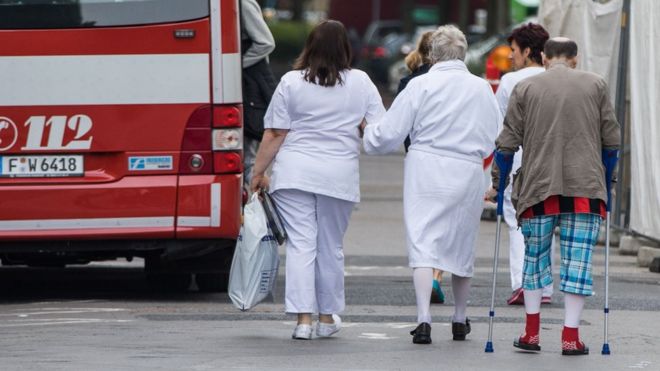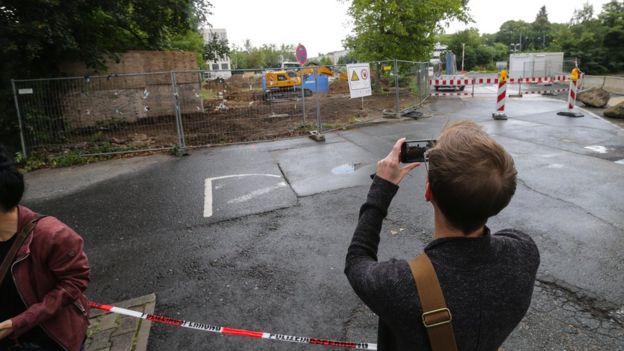Frankfurt hospitals evacuated before WW2 bomb disposal
 AFP
AFP
Patients at hospitals in Frankfurt have been moved to prepare for the controlled explosion of a huge bomb left over from World War Two.
The 1.4 tonne British bomb, found on a building site on Wednesday, will be made safe on Sunday.
About 65,000 people must leave their homes and police have said they will imprison anyone who refuses to go.
It is Germany's biggest post-war evacuation. A smaller one took place on Saturday in Koblenz.
In the city 110km (68 miles) west of Frankfurt, 22,000 people had to leave their homes for four hours while experts disposed of a World War Two bomb that had been found during preparations for building a new kindergarten.
Thousands of unexploded bombs from the war are still found in Germany every year.
Last month a kindergarten was evacuated after the teacher found an unexploded World War Two bomb on a shelf. Police said a child had found it on a woodland walk and brought it inside.
A councillor in Frankfurt, which is Germany's financial hub, told Reuters news agency that more than 100 patients from two hospitals were moved on Saturday.
He said they included premature babies and people in intensive care.
The fire brigade tweeted (in German) that 500 more would be moved from care homes early on Sunday.
Fire and police chiefs in the city warned that an uncontrolled explosion of the HC 4000 bomb would be powerful enough to flatten an entire street.
 EPA
EPA
The operation will take at least 12 hours and evacuees will have to leave their homes by 08:00 local time (06:00 GMT).
Police helicopters will carry heat detecting cameras to detect anyone who had not left the area before the bomb disposal experts begin their task. Police also said they would guard empty houses and apartments from burglars.
The evacuation area includes 20 retirement homes, an opera house, and Germany's central bank where half the country's gold reserves are stored.
The city has opened shelters for evacuees to spend the day, and most museums are opening their doors for free.
So, how many unexploded bombs are there in Germany?
An average of about 2,000 tonnes of unexploded ordnance are found each year in Germany. It's estimated that about half the 2.7 million tonnes of bombs dropped by Allied powers during World War Two landed on German soil (compared to about 74,000 tonnes of bombs dropped on the UK by Germany). Many of the bombs were equipped with malfunctioning time-delay fuses, and many never went off.
Adding to the problem are Russian artillery shells, German hand grenades and tank mines, as well as Russian munitions from training facilities in post-war East Germany.
The problem is so widespread that Germany has a bomb-disposal unit, the Kampfmittelbeseitigungsdienst (KMBD), dedicated to the problem. Its technicians are among the busiest in the world, deactivating a bomb every two weeks or so - and they estimate their work will continue for decades to come.
Do the bombs pose a real threat?
Dozens of bomb-disposal technicians and hundreds of civilians died from uncontrolled explosions in the decades following the war. The rate of fatalities has slowed since, with 11 technicians said to have been killed in Germany since 2000.
But experts warn that the devices that remain could be getting more unstable as the munitions age and their fuses grow more brittle, and as bombs are discovered in more built-up, harder-to-reach areas.
The problem is also worse in certain parts of Germany. Oranienburg, just outside Berlin, has the dubious distinction of being the "most dangerous town in Germany". Under Adolf Hitler, it contained an armaments hub, aircraft plant, railway junction and a nuclear research facility - so it was a key target for the Allies, who gave it an aerial pounding. Almost 200 bombs have been defused in the town since the end of the war, and residents are well-drilled in the evacuation procedure. But with experts estimating that some 350-400 bombs remain buried, the task is far from complete.
Other WW2 bombs recently discovered in Germany
- May 2017: 50,000 people were evacuated from Hannover while three British-made bombs were defused
- December 2016: More than 50,000 evacuated in Augsberg over 1.8-tonne British explosive
- May 2015: 20,000 people in Cologne forced to leave their homes after a one-tonne bomb was discovered
- January 2012: A construction worker was killed when his digger hit an unexploded bomb in Euskirchen
- December 2011: 45,000 people were evacuated from Koblenz - half the total population - after two bombs were found in the riverbed of the Rhine
- June 2010: Three members of a bomb disposal squad were killed in Göttingen during an operation to defuse a bomb found on a building site



No comments:
Post a Comment